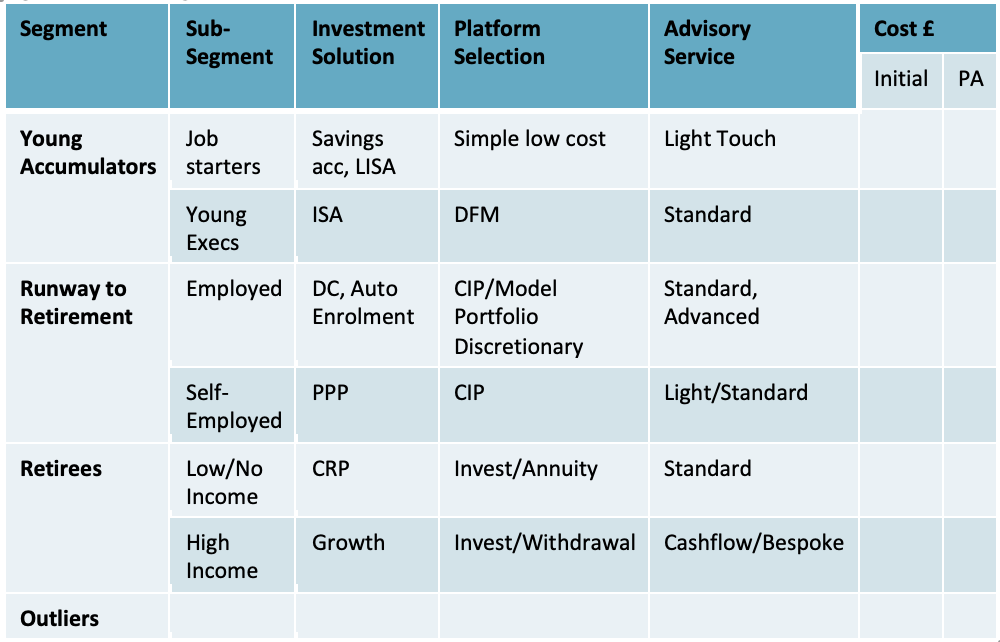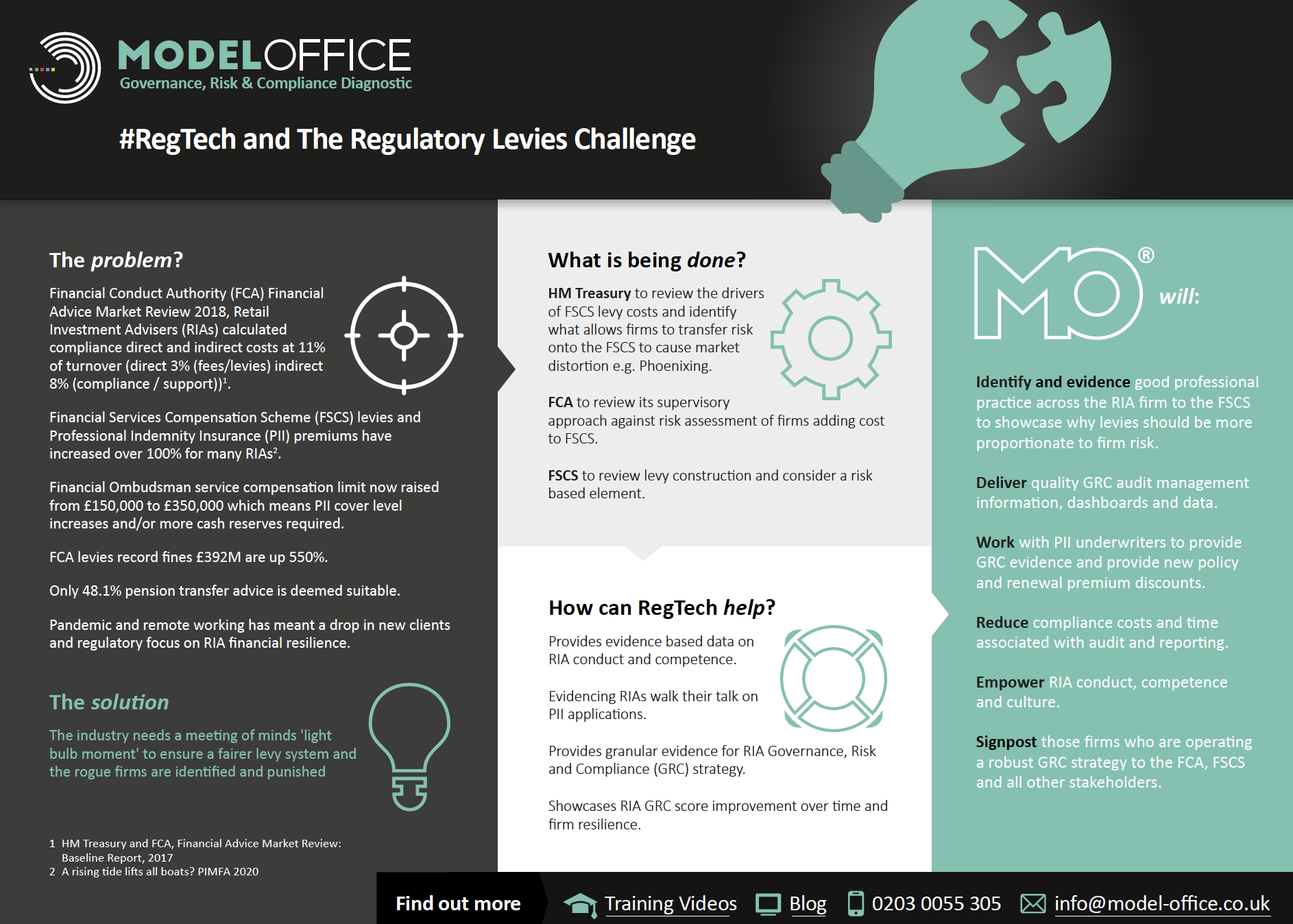Enforcing regulatory compliance can be enough of a challenge when your workforce is in the office. When they are dispersed, how can you be sure that your marketing and communications collateral adheres to FCA rules?
Remote working and the compliance challenge
[fa icon="calendar'] Apr 23, 2021 10:16:12 AM / by Chris Davies posted in Financial regulation, Financial business development, fintech, regtech, Risk management, practice management, FCA, advice, HMT, suitability, FAWG, FAMR, MiFIDII, SMCR, Data, GDPR, Chatbot, Culture, Enforcement, supervision, audit, Conduct, AI, Risk,, Accountability, Platforms, PROD, Product governance, digital,, Regulatory, Reporting, resilience, cyberrisk, levies
RegTech: if not now when?
[fa icon="calendar'] Mar 26, 2021 10:46:59 AM / by Chris Davies posted in Financial regulation, Financial business development, fintech, regtech, Risk management, practice management, FCA, advice, HMT, suitability, FAWG, FAMR, MiFIDII, SMCR, Data, GDPR, Chatbot, Culture, Enforcement, supervision, audit, Conduct, AI, Risk,, Accountability, Platforms, PROD, Product governance, digital,, Regulatory, Reporting, resilience, cyberrisk, levies
“Business is no difference to sport, data and technology is a very powerful tool, but only if every individual in your team knows how and why they are using it” Sir Clive Woodward England Rugby world cup winning manager
At Model Office we love sports analogies and we would recommend any business who either believes in data analytics or not read or watch Moneyball, an account of Oakland Athletics baseball team’s 2002 season and their general manager’s attempts to assemble a competitive team. The story focuses on the adoption of a ‘sabermetric’ system that employs quantitative diagnostic technology to collect and summarise relevant data from game activity.
This data can measure and predict performance trends and showcase players who are most suited to influencing how a team wants or needs to play to win.
Why is this relevant to financial services I hear you ask?
Well the rule book demands a certain standard of performance as do clients and yes business stakeholders. We are witnessing a digital revolution, some call it the 4th industrial revolution and this provides retail investment advice firms, networks and support services to employ data analytics and diagnostics so they embed an evidence based practice and can assess behavioural trends such as individuals and firm competence, conduct and how this influences their culture and clients. Great for compliance with the Senior Managers and Certification Regime (SM&CR).
The results for a business who does employ such technology can be impressive. RegTech alone can offer high level and granular analysis of how firms governance, risk and compliance management processes are effecting performance. The FCA’s 5 Conduct Questions Programme showcases that firms who monitor and manage compliance risk management create a constructive culture which has a positive effect for sustainable professional performance.
How can RegTech help?
Utilising diagnostic technology can help market participants due to:
- Increased evidence to showcase good practice that can help reduce regulatory levies such as professional indemnity insurance (PII) and streamline audit practice saving time and costs
- Technology integration where application programming interfaces (APIs) can enable tech to ‘talk’ and data share and deliver streamlined regulatory reports across key areas such as:
- Client data quality
- AML/KYC/PEP sanctions
- PROD and Client Segmentation ensuring;
- Services and products are suitable for end client needs
- ESG analysis to assess client needs and objectives
- Vulnerable clients are identified and provided the correct services
- Assessing missing information from client valuations
- AI text analysis to auto-audit compliance policy documents and automat client file reviews
- Advice suitability checks identifying underinsured or underinvested clients
- Assessing adviser supervision and adviser training and competence requirements
- Ensuring Investment, Mortgage, Insurance advice is compliant with COBS, MCOBS and ICOBS
- Self-Audit and aligning business models with the regulations ensuring firms know they comply and assess and rectify blind spots and weaknesses
- Increase Management Information (MI) and cut time and costs associated with compliance
- Move away from ‘swivel chair’ compliance where disparate solutions (mainly spreadsheets) are used, to a single source SaaS or Cloud based dashboard providing heatmapping, AI algorithms to highlight trends and produce streamlined reports
One message that the FCA presents in their business plans is that both financial services providers, networks and support services plus the bodies that regulate them must act to adapt to, and enjoy the benefits of, technology and innovative approaches. This takes courage and a medium-long term view so the real benefits that RegTech can deliver more cost and time efficient practice than current strategies.
Back to sport, you only have to look at examples such as Sir Clive Woodward’s excellent speech at the PFS 2017 Festival of Financial Planning at how important it is for business to adopt and embed analytic and diagnostic technology into their everyday practice. This way they will have all the evidence as to how to ensure sustained professional practice and win!
So, with such benefits in a changing market, the question has to be asked: ‘RegTech, if not now when?’.
PRODing to ensure suitability and client best interests
[fa icon="calendar'] Feb 19, 2021 9:39:01 AM / by Chris Davies posted in Financial regulation, Financial business development, fintech, regtech, Risk management, practice management, FCA, advice, HMT, suitability, FAWG, FAMR, MiFIDII, SMCR, Data, GDPR, Chatbot, Culture, Enforcement, supervision, audit, Conduct, AI, Risk,, Accountability, Platforms, PROD, Product governance, digital,, Regulatory, Reporting, resilience, cyberrisk, levies
Having attended another excellent Octo-Members virtual pub event Wednesday (I also enjoyed a ‘virtual’ alcohol free beer 🍺) the topic circled the old chestnut for suitability and appropriateness of centralised investment propositions (CIP) for the business and their clients.
This is a subject that has stood the test of time in generating debate over issues such as value chains, fund managers ego’s, regulatory stance of shoe-horning or retro fitting and off course the old ‘can I use one platform or investment proposition across my client base’ question…
The truth of the matter when debating and attempting to find solutions is that there is no definite solution, it all depends on variables such as the client’s on-going needs and objectives, the firm’s business model, regulatory directives such as PROD and advice suitability, technology solutions and research tools and good old trusted professional behaviour across all relevant stakeholders such as product manufacturers, fund managers and wealth managers, advisers and planners.
What is crucial is that the trusted behaviour meets the high standards the FCA set across conduct (behaviour) and competence (skills) plus ensuring the right culture is in place for individuals to ‘do the right thing’ by their clients. Integrity is key.
It was clear (to me) from the Octo-members virtual pub debate that there are many moving parts but also each component is no silver bullet. For example technology built well is an enabler to efficiency’s across communications, operations, systems and controls but on its own is not going to solely fix the CIP or advice suitability conundrum.
What’s needed is a joined up approach with suitability being the end product of the sum of many parts coming together seamlessly.
The PROD rules can help here. They are aimed at ensuring the product manufacturers build their products with the end user’s needs in mind I.e. the client. Plus, they also need to ensure such products are distributed correctly to the end user, so the Retail Investment Advice (RIA) firms research and due diligence comes in as does, wait for it…client segmentation.
Figure 1 Product Governance Product manufacturer requirements
Dealing with increasing regulatory levies
[fa icon="calendar'] Feb 12, 2021 10:43:14 AM / by Chris Davies posted in Financial regulation, Financial business development, fintech, regtech, Risk management, practice management, FCA, advice, HMT, suitability, FAWG, FAMR, MiFIDII, SMCR, Data, GDPR, Chatbot, Culture, Enforcement, supervision, audit, Conduct, AI, Risk,, Accountability, Platforms, PROD, Product governance, digital,, Regulatory, Reporting, resilience, cyberrisk, levies
It's not going away any time soon is it? With IFAs reporting a 76% hike in Professional Indemnity Insurance (PII) premiums the hardened regulatory levies are really biting and squeezing firm margins at a time of economic uncertainty given the on-going pandemic.
At Model Office-MO® we continue to press that regulatory levy stakeholders such as the Financial Services Compensation Scheme (FSCS) Financial Ombudsman (FOS) and PII need to take firm’s soft data i.e. their competence, conduct and culture into account when assessing firm’s risk and potential consumer harm.
Unfortunately and presently, there is a trend to look at the market risk rather than individual firm risk, this can be seen in the recent FSCS plan and budget 2021/22 statement which sees a forecast levy of £1.04BN which represents an increase of £339M from the previous year and there is a £78m supplementary levy (£44.5m invoiced this month).
This increase is down to the fact the FSCS anticipates an ongoing increase in complex pension advice claims and additional failures of self-invested personal pension (SIPP) operators. It also expects increased firm failures due to the economic impacts of the coronavirus pandemic, as do the FCA who estimated up to 4000 firms are at risk of failure given the data received from their financial resilience questionnaires.
As we wrote in March 2020, we also have had the FOS increased limit rise from £150,000 to £350,000 and reports of 300%+ increases in PII premiums post FCA DB pension transfer directives means the industry is now facing a real dilemma. Indeed due to this rise, the FCA says nearly 300 financial advice firms reported their PII cover for claims was non-compliant. So, we have a perfect storm, increasing regulatory levies, a pandemic and increasing potential for customer harm!
What can we do I hear you ask?
The FSCS talk about the fact they are attempting to reduce levies through data analysis and sharing with the regulators , the FCA’s consumer investment data review 2020 wants to ensure customers are educated on financial scams and their 2021/22 business plan wants to ensure all firms offer suitable advice, are resilient and are cyber-secure and the FOS, well….
In relation to these points, firms who use RegTech to audit and analyse their business governance, risk and compliance (GRC) competence and conduct can increase their profile in evidencing data and culture that showcases they are a good risk for PII insurer underwriters which can then have positive influence on renewal rates.
We do remain concerned that the apparent ‘homogenous’ approach to calculating levies and monitoring risk is severely penalising the majority of firms who are doing a good job in operating compliant businesses. At the end of the day, the regulator and FSCS have created a cause and effect conundrum; the higher the levies, the higher the costs to the end user, i.e. the client which completely defeats the FCA premise of consumer protection!
What is very apparent from our work in the RegTech sector is that technology can provide evidence based practice to identify good and bad GRC practice and ensure firms evidence they are ‘walking their talk’ on regulatory GRC competence and conduct requirements.
RegTech that monitors a firms GRC can then provide hard evidence that a firm is meeting all relevant regulatory requirements at business operations, systems and controls and people management level. This can in turn, provide valuable data to PII underwriters across their risk evaluation metrics that a firm risk (rather than a market risk) is the main factor for assessing the premium levels and any necessary premium risk loading.
RegTech can also integrate with InsureTech and thus provide a powerful GRC audit process for those PII underwriters who are adopting technology in their underwriting processes.
The FSCS can also use such RegTech data to better assess the soft and hard facts across business behaviours in the market and come to an informed (evidence-based) judgement on firm levies. Such GRC conduct and competence data should allow the FSCS to class firms more realistically and thus segment the market fairly into those firms performing well, those who need more support and the rogue firms causing the most damage.
There are other potential solutions some eloquently detailed by Personal Investment Management Association (PIMFA) in their excellent 2020 paper ‘A rising tide lifts all boats; a roadmap towards better consumer outcomes and lower levies’and in their 12 recommendations to bring government, regulators and wider industry to work together.
The current ‘homogenous’ approach taken, tends to place all firms within the same class and thus we have the issue where compensation is paid by all, not just those that cause the loss (if they are still active and have not attempted ‘pheonixing’).
By using RegTech GRC data, regulatory stakeholders will be able to better segment the market and thus then identify those firms causing detriment who should pay and if found insolvent then any wind up should include terms for payment of a levy from available assets.




